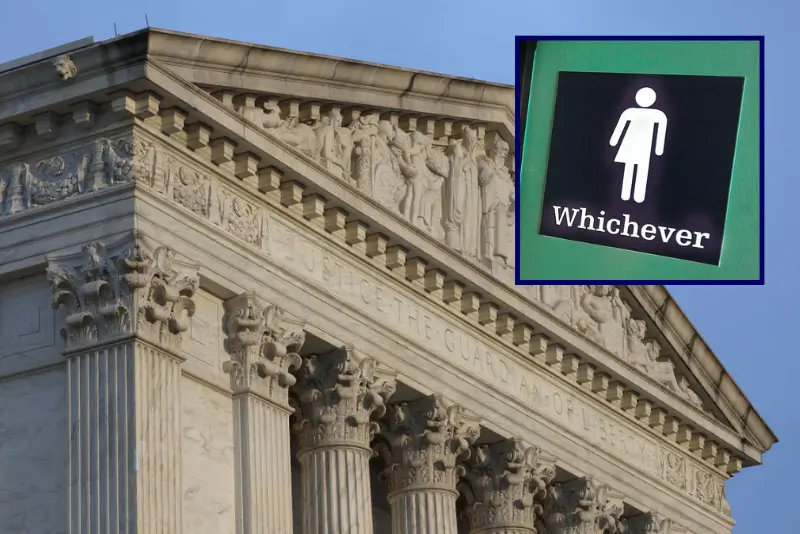
OAN Staff Katherine Mosack
2:22 PM – Friday, August 29, 2025
23 states have filed an amicus brief urging the U.S. Supreme Court (SCOTUS) to allow South Carolina to enforce its policy requiring students to use school restrooms and locker rooms corresponding to their biological sex.
Indiana Republican Attorney General Todd Rokita led the charge in relation to the 23 states filing the amicus brief on Friday. He asked SCOTUS to halt an injunction from the Fourth Circuit Court of Appeals that would overturn a state law banning boys who identify as girls from girls’ private spaces in schools and locker rooms.
The amicus brief argues that the Fourth Circuit has been “mandating policies that deprive schoolchildren of privacy during vulnerable moments.”
The brief also references the 2020 Supreme Court ruling made in the Grimm v. Gloucester County School Board case. Gavin Grimm was a transgender-identifying student who claimed that the school’s policy prohibiting students from using the opposite sex’s bathroom violated the Equal Protection Clause of the 14th Amendment and Title IX of the Education Amendments of 1972 — which prohibits sex-based discrimination in federally funded schools.
The brief criticized the Fourth Circuit’s interpretation of the Equal Protection Clause and Title IX, arguing that the decision improperly mandated policies that could compromise student privacy and safety.
“The Fourth Circuit has since expanded Grimm, wielding its logic to invalidate regulations on gender-transition procedures and providing for sex-separated sports teams,” the brief asserted.
Additionally, the document touched on subsequent court rulings that contradicted the 2020 decision. In a case called United States v. Skrmetti, the Court ruled in favor of Attorney General of Tennessee Johnathan Thomas Skrmetti, upholding Tennessee’s Senate Bill 1 — which bans puberty blockers and hormone therapy for “affirming a minor’s gender identity.”
“No child should fear for their safety or privacy when using a bathroom, changing in the locker room, or showering after sports,” Rokita stated. “Forcing schools to mix boys and girls in these types of spaces shouldn’t be allowed or tolerated, and we’re going to continue fighting to stop it.”
South Carolina Attorney General Alan Wilson was involved in the submission of the amicus brief as well. He announced the action in a statement on Friday.
“South Carolina passed this law to protect the privacy and safety of every child in our schools,” Wilson said. “But activist judges on the Fourth Circuit threw out common sense and the will of the people to give one student a special exception. What about the rights and safety of all students? Where does it stop? This is judicial activism at its worst, and we’re fighting back. South Carolina will not stand by while ideology is put ahead of children’s safety. I am taking this fight all the way to the Supreme Court.”
“South Carolina’s law is grounded in biological reality and protects the privacy, safety, and dignity of every child. No activist court should force schools to abandon common sense or put ideology ahead of student well-being. I’m proud to take this fight to the steps of the Supreme Court — to defend our law, protect our children, and preserve sanity in our schools,” said South Carolina Superintendent Ellen Weaver, who also supported the document.
Regardless of how the Supreme Court ultimately rules on the case, Wilson emphasized that he remains committed to advocating for policies that prioritize and safeguard the privacy and safety of children in school restrooms and other gender/sex-specific spaces.
He stated that, irrespective of the Court’s decision, he will continue to work with lawmakers, educators, and parents to ensure that students have access to facilities that respect both their privacy and their developmental needs — framing this effort as a core responsibility of school administrators and policymakers.
“This case is about more than one school district,” Wilson added. “It is about whether unelected judges will override the will of parents and legislators, or whether South Carolina and other states will retain the authority to safeguard student privacy in the most sensitive spaces.”
Stay informed! Receive breaking news alerts directly to your inbox for free. Subscribe here. https://www.oann.com/alerts
What do YOU think? Click here to jump to the comments!
Sponsored Content Below

